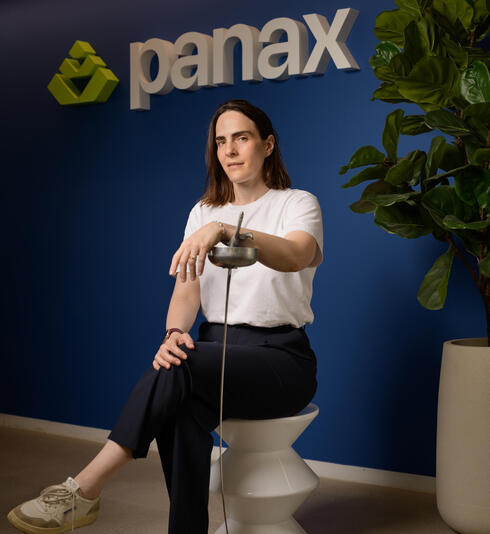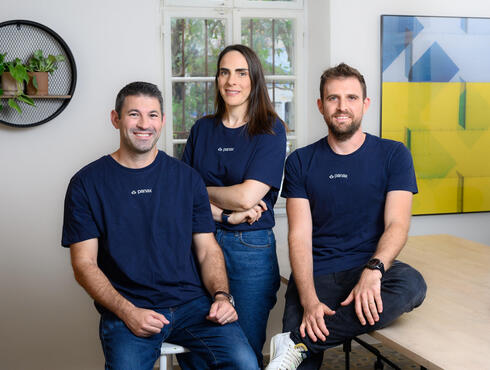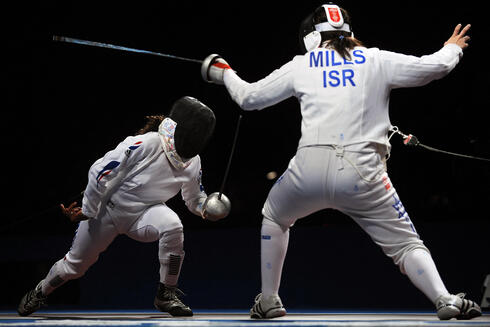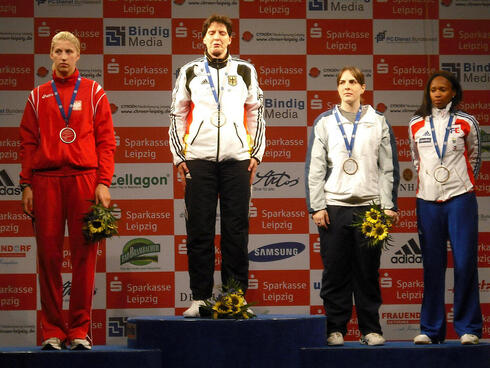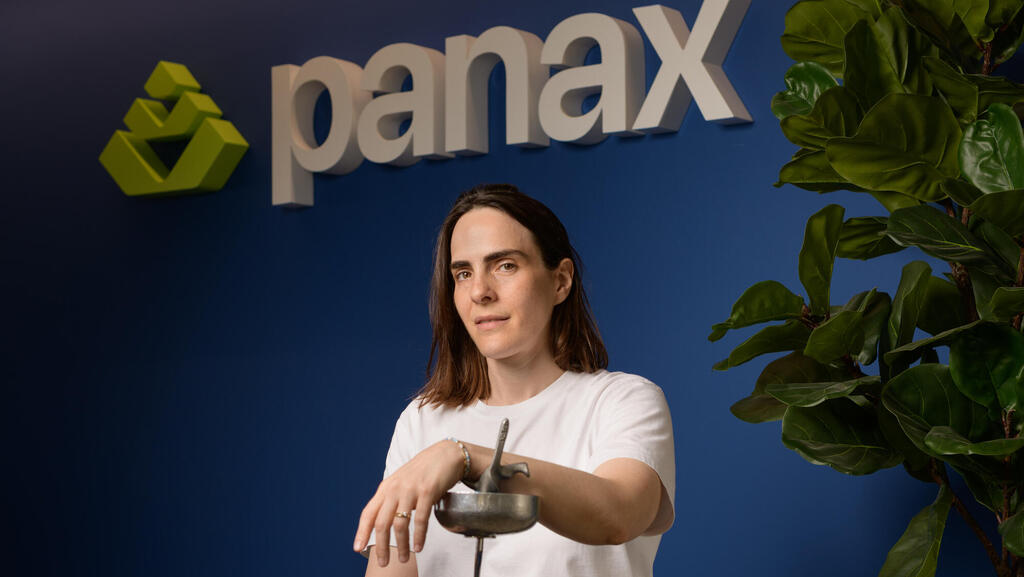
En garde: From Olympic fencer to startup founder
At 19, Israeli Noam Mills was the top-ranked fencer in the world in her age group and was on the way to becoming an Olympic athlete. Her journey took a sharp turn at Harvard, where she realized her ambitions extended beyond sports. Now the co-founder of Panax, a startup building a cash flow management platform, Mills explains how elite competition shaped her as an entrepreneur, and why she doesn’t look back.
"Competitive sports build character. Talent is a prerequisite, but it’s never enough on its own. You have to learn how to handle failure, absorb ups and downs, and tolerate discomfort - all of which require serious mental training. Especially in fencing, which is an intensely mental sport. I have to constantly read my opponent, surprise them, pressure them to attack so I can counter quickly and strike. Decide, execute, adapt. It’s constant problem-solving. Even if I faced the same opponent for a year, it would keep evolving. I’d keep learning something new. It’s never boring."
In 2006, at just 19 years old, Noam Mills made history: she won two World Youth Cups in épée fencing and was ranked first in the world among under-20 competitors. Two years later, she became the first Israeli to ever compete in the Olympic épée, representing her country at the Beijing 2008 Games.
Much has changed since then. Mills has since hung up her épée and today channels the mental discipline she honed in elite sports into building Panax, a fintech startup she co-founded three years ago. The company, which developed a platform for automated cash flow management, was recently ranked 25th in Calcalist’s Most Promising Startups list for 2025.
"There’s a real similarity between competitive fencing and founding a startup," she says. "Both are irrational choices in many ways. The odds of success are low. But you do it because you believe the experience is worth it."
Why did you walk away from the sport, after coming so far?
"At no point in my fencing career did I feel like I was living the dream," she says. "It was Sisyphean. My life revolved entirely around improving my performance, waking up early even when I didn’t want to, flying to endless training camps, competing all over. People would say, ‘You’re doing what you love,’ but the day-to-day wasn’t fun. The satisfaction from a win is fleeting compared to the time you invest. And you spend most of your time coping with losses, because you’re constantly being judged. One bad practice or a string of poor results can shake your entire sense of self."
And is startup life less Sisyphean?
"It has its own difficulties, bringing in customers, hiring, managing investors, constantly fixing things that don’t work. It’s still like pushing a boulder uphill. But now, once in a while, I can pause and see how far I’ve come. That gives me real satisfaction, even if the summit still feels far away."
How has your motivation changed?
"Today I’m driven by the desire to win, not the fear of losing. That’s growth. In fencing, the need to win felt existential - like if I didn’t win, I wasn’t worth anything. Under intense pressure, it became physical. I’d feel like throwing up before competitions. At every international event, someone was throwing up in the bathroom. When I put on the mask and stepped onto the strip, I could perform, but it wasn’t pleasant. I don’t miss that sick feeling. Yes, that anxiety can be fuel, but only up to the point where it doesn’t become paralyzing. Part of growing up has been building an identity that goes beyond fencing."
"The dream of becoming a world champion disappeared when I studied at Harvard"
Mills now lives in Tel Aviv with her partner and their one-year-old son. She grew up in Hod Hasharon, the middle daughter of a mother who works for an insurance company and a father who owned a lighting fixture business. At the age of nine, she first signed up for a fencing class at school.
"It was completely random," she says. "Because we lived far from the school, we could only sign up for after-school classes that started immediately, so we could catch the bus home. The only options were fencing or flute. And since I had a competitive streak, I said, 'Let’s try fencing.'"
Success came quickly. Mills soon began training at a club in Kfar Saba, started competing, and by age eleven had already been crowned Israeli champion. At thirteen, she joined the national team, and at seventeen, she began training with Ohad Balva, who would later become the head coach of Israel’s national team. Balva recalls her as “a master of decision-making who blends analysis with intuition. You can’t give her an instruction unless she sees the logic in it, and you definitely can’t bore her.”
The year 2006 was a turning point in Mills’ life. That year, she won two World Youth Cups and was ranked first in the world in the under-20 category. But it was also the year her father contracted an infection that caused severe brain damage; he later passed away.
"My breakthrough in the sport happened during the same year I was spending a lot of time in the hospital," she says. "It gave me perspective, it made me realize there are other important things in life, not just fencing."
It’s sad to think your father didn’t get to see your major victories.
“He saw me as part of the Israeli youth team. He saw the potential. Of course, I would have loved for him to see more. Just two years after he passed, I competed in the Olympics and got accepted to Harvard. Maybe he would have been even prouder of that. My mother always came with me to competitions, but my father couldn’t. He had a hard time with the excitement. And I get it, sometimes the stress of watching a match is worse than actually being on the strip.”
Then came the disappointment at the Beijing Olympics, where you lost in the first round.
“I took it really hard. Just a month earlier, I had placed seventh at the European Championships, and I’d actually beaten the fencer who went on to win Olympic gold. I cried after I was eliminated, and I remember having to hold back the tears during interviews with the media immediately afterward.”
From that point on, her relationship with the sport that had defined her life began to change. Just a week after the Olympics, she started her undergraduate studies at Harvard, pursuing a major in economics and a minor in neuroscience, an opportunity she attributes directly to fencing.
“Harvard’s fencing coach, Peter Brand, is Jewish. He came to the Maccabiah Games in 2005 looking for students who could score high enough on the admissions tests and also join his team. At the time, I was serving in the army as an outstanding athlete. Without fencing, studying at Harvard wouldn’t have even been a dream.”
You got into Harvard thanks to fencing, but eventually drifted away from it.
“That’s right. The world opened up to me, and fencing started to take a back seat. In the beginning, I was still traveling to competitions and training camps around the world with the Israeli national team, and Harvard was quite flexible with me. I remember flying to a competition in Brazil, and they sent me a game theory exam in a sealed envelope, Ohad, my coach, made sure I did it properly.”
“But in my fourth year of undergrad, I was accepted into Harvard’s MBA program. It’s a hands-on degree that you can only begin after two years of work experience. That set me on a different path and sparked a new passion. During those two years, I worked as a consultant at the Tel Aviv office of BCG, a leading strategy consulting firm. It was incredibly demanding, and fencing, once the center of my world and the peak of my ambitions, became just one part of a much larger life.”
When did you realize this was it?
"Toward the 2012 London Olympics. I knew that to be at my peak, I had to give it my all. At that point, I realized I was going to take a different path and essentially give up competitive fencing. I left knowing I still had more to give, but I made a decision, and I was at peace with it."
You retired from fencing at age 26. That’s quite young. How do you walk away from an extraordinary talent that brought you such impressive achievements?
"Fencing isn’t just about talent; it requires relentless hard work. And my mindset had shifted. My dream was no longer to be world champion, it was to sit at the decision-making table, to influence the boardroom where big business decisions are made. I had a new appetite. I wanted to move beyond consulting from project to project, and become someone who implements a project herself."
In 2014, Mills returned to Harvard to pursue an MBA. "I fenced recreationally on the university team, but I haven’t stepped into a competition hall since. I won’t enter a competition unless I’m the best trained and there to win. It’s just not in my nature."
After completing her MBA, Mills returned to Israel. She worked for two years on the investment committee of the FIMI fund, then as a manager at the AI startup SparkBeyond, and later as CFO of Mixtiles, a home design app. In 2022, she decided to launch her own startup.
When did you know you wanted to start your own company?
"The FIMI fund, which acquires control of companies to improve them, was an amazing learning experience. That’s where I first felt the desire to be on the side that makes decisions and takes responsibility. A coach can advise you, but in the end, you’re the one who executes. At a certain point, I knew I was ready to launch something of my own, it was time to make that leap. If others with less experience can do it, then so can I."
Why do you think this kind of leap happens later in life for women?
"As Sheryl Sandberg wrote in Lean In, men apply for jobs when they meet about 60% of the listed qualifications, while women tend to apply only when they meet 100%."
“Every failure in business feels like losing a competition. You feel it physically”
Mills co-founded Panax in 2022 with Niv Yaar, a colleague from the FIMI investment committee, and Sefi Itzkovich, formerly CTO at Otonomo. Today, Panax has 32 employees, most of them in Israel and some in New York, where Yaar, now CBO - lives. Since its founding, the company has raised $15 million across two funding rounds.
The idea for Panax grew out of Mills and Yaar’s shared experience at FIMI, where they repeatedly encountered a glaring problem: fast-growing small and medium-sized companies lacked proper tools for managing cash flow.
"Whenever we asked questions like ‘What’s the current cash balance?’, ‘Where will it be by quarter’s end?’, or ‘Are we in a good position to pay off debt next month?’, the answers were vague at best, often something like, ‘We’ll get back to you in a week.’ Things were even worse for companies with multiple bank accounts in different currencies, or with inventory in one country and suppliers to pay in another.
"We kept running into this blind spot. Companies had accounting systems, but not cash visibility. ERP tools focus on past financial statements, not real-time cash management. Cash, the oxygen of the company, was often tracked manually in Excel. But by the time you figure out what’s going on, the picture has already changed.
"Niv and I realized this was a major gap. We started exploring what solutions were out there and found only expensive, complex tools meant for large enterprises. Everyone else had no real solution. And the problem only worsened when interest rates began rising.
"A mutual friend introduced us to Sefi, who brought the technological expertise we needed. The chemistry between us was immediate, and in 2022, we launched Panax."
Related articles:
What does the system you developed provide?
“A cloud-based technology platform that connects all the places where money resides in an organization, from bank accounts to digital wallets and other fintech solutions. We collect this data in real time, standardize and process it, and enrich it using AI to identify risks and opportunities. We automate a lot of routine tasks, freeing finance teams from Sisyphean manual work so they can accomplish more with fewer resources.
“Take, for example, the impact of Trump’s tariffs on cash flow. Our system helps organizations address these kinds of challenges by factoring such scenarios into its analysis.
“With the pace and intensity of business today, speed of response is critical, and that starts with quickly gathering and decoding the data. That’s exactly what our platform does: it lifts the burden of tedious tasks and raises red flags when needed, empowering informed decision-making.”
Does running a startup satisfy your competitive drive?
“We’re a company that wants to grow fast in a competitive environment, and that absolutely taps into my drive to achieve. I feel a sense of victory with every milestone, every new customer who signs on, every satisfied client who gives positive feedback, every successful product upgrade. It’s like winning a match.
“On the flip side, every failure or unresolved challenge feels like losing a competition. You experience it physically.”
How is it different from competitive fencing?
“In fencing, you have a coach, a physiotherapist, and a psychologist, but when the match starts, you’re alone. In a startup, not only do I have co-founders, I need them. If I tried to do everything by myself, I’d definitely fail. Each of the founders is a true partner in this journey, and working together as a single unit only makes us stronger.”
You raised two funding rounds, one of them during the war. Did you feel the impact of the war among your customers?
“We’re building a product that customers genuinely love and use. So far, we haven’t felt politics interfering in our business, and I hope that continues to be the case.”
That’s not the case in competitive fencing. A month ago, the Israeli team won gold at the European Under-23 Championship, and at the medal ceremony, the Swiss team turned its backs during the playing of the Israeli anthem. How did that make you feel?
“Sport is supposed to bring people together from all over the world, so when politics gets mixed in, it really sucks. But I also understand that when you represent a country and have a flag on your back, it's sometimes inevitable.
“For years, I’ve faced athletes from countries that boycott Israel, they wouldn’t shake my hand or show up to compete. The Swiss Fencing Federation took disciplinary action, which is encouraging. But the International Fencing Federation must take a stronger stance. They need to communicate clearly what’s acceptable and what isn’t, and impose consequences on those who break the rules.”
Do you miss the sport?
“I still dream about fencing, and I occasionally train with the Israeli team at Wingate. Of course, I still watch competitions and follow our fencers closely, but I don’t envy them. Toward the end of my competitive career, I stopped getting excited before matches. It didn’t hurt my performance at first, but it was a clear signal: the passion wasn’t there anymore.
“And there’s a silver lining. It’s not mentally healthy to tie all your self-worth to the next match. That kind of all-or-nothing mindset just isn’t good for me anymore. Only my mother still hasn’t given up hope that I’ll return to competitive fencing - she’s still holding on.”
